 Petzlover
Petzlover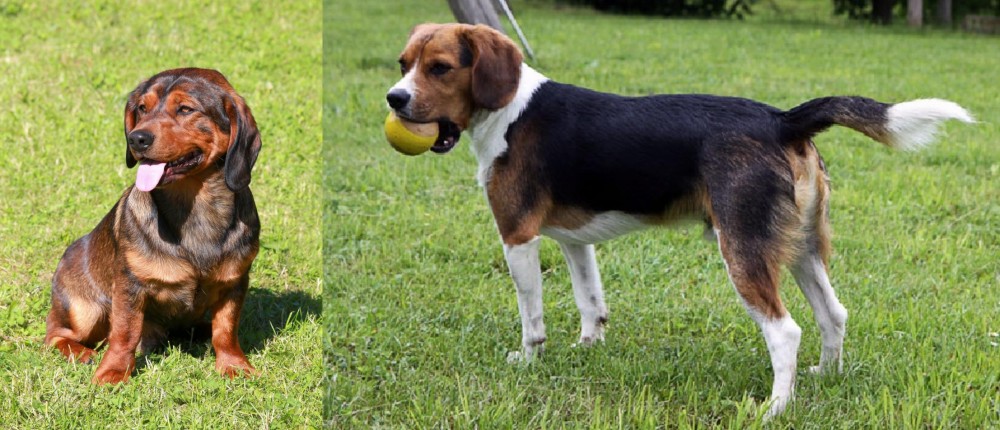 Alpine Dachsbracke is originated from Austria but Beaglier is originated from Australia. Both Alpine Dachsbracke and Beaglier are of same height. Alpine Dachsbracke may weigh 8 kg / 18 pounds more than Beaglier. Both Alpine Dachsbracke and Beaglier has almost same life span. Both Alpine Dachsbracke and Beaglier has almost same litter size. Alpine Dachsbracke requires Moderate Maintenance. But Beaglier requires High Maintenance
Alpine Dachsbracke is originated from Austria but Beaglier is originated from Australia. Both Alpine Dachsbracke and Beaglier are of same height. Alpine Dachsbracke may weigh 8 kg / 18 pounds more than Beaglier. Both Alpine Dachsbracke and Beaglier has almost same life span. Both Alpine Dachsbracke and Beaglier has almost same litter size. Alpine Dachsbracke requires Moderate Maintenance. But Beaglier requires High Maintenance
 They are aggressive enough for hunting and tracking large animals as well as small, but they are gentle enough to bring an injured animal back to the hunter without hurting it more.
They are aggressive enough for hunting and tracking large animals as well as small, but they are gentle enough to bring an injured animal back to the hunter without hurting it more.
At one time the breed was a crown favorite, accompanying Prince Rudolph of Habsburg on his hunting excursions. The Alpine Dachsbracke is still a favorite hunting breed but is now more often found as a family pet.
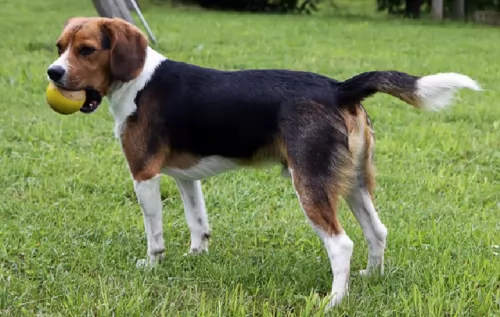 The Beaglier beginnings are set in Australia. Before around 30 years, breeders cross-breed the Beagle and the Cavalier King Charles Spaniel. The result actually turned out great – new we have a small sized breed with a wonderful, soft coat, very likeable looks, the calm and gentle dog which is very active despite his relaxed nature. They can be found around the globe nowadays and they are very popular because of their sweet nature.
The Beaglier beginnings are set in Australia. Before around 30 years, breeders cross-breed the Beagle and the Cavalier King Charles Spaniel. The result actually turned out great – new we have a small sized breed with a wonderful, soft coat, very likeable looks, the calm and gentle dog which is very active despite his relaxed nature. They can be found around the globe nowadays and they are very popular because of their sweet nature.
 The Alpine Dachsbracke is a short, stocky dog with a long body and short legs. It is big boned and robust with round eyes. It has black toenails and a short, dense red or black coat.
The Alpine Dachsbracke is a short, stocky dog with a long body and short legs. It is big boned and robust with round eyes. It has black toenails and a short, dense red or black coat.
The bridge of his nose is straight with a strong muzzle. Its forehead has a well defined furrow and black lips and nose. He is muscular and his chest is broad and deep. He holds his tail high and has a trotting gait.
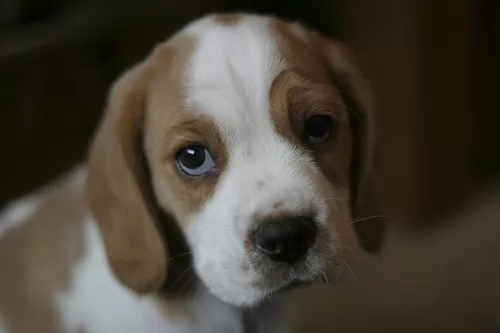 This small dog breed, called Beaglier and Beagler, has the look of his parents. Sometimes, they look more like the Spaniel, and sometimes they look more like the Beagle. This actually means that they are usually small, but can be, in some cases, even medium sized dog. They are usually tricoloured and in most cases, they have dark brown and cream hairs with white markings. They have longer ears, sometimes with more hairs if they look more like the Spaniel. They have large, dark brown eyes and usually dark nose. This breed is very loving and affectionate. They have a high need for a daily activity and they are the best choice for families with children.
This small dog breed, called Beaglier and Beagler, has the look of his parents. Sometimes, they look more like the Spaniel, and sometimes they look more like the Beagle. This actually means that they are usually small, but can be, in some cases, even medium sized dog. They are usually tricoloured and in most cases, they have dark brown and cream hairs with white markings. They have longer ears, sometimes with more hairs if they look more like the Spaniel. They have large, dark brown eyes and usually dark nose. This breed is very loving and affectionate. They have a high need for a daily activity and they are the best choice for families with children.
 The Alpine Dachsbracke is a very lovable family dog even though he was bred to hunt and scent. They are great with kids and at their size are still good apartment, inside dogs. Though they need daily exercise they don’t need a large fenced in yard.
The Alpine Dachsbracke is a very lovable family dog even though he was bred to hunt and scent. They are great with kids and at their size are still good apartment, inside dogs. Though they need daily exercise they don’t need a large fenced in yard.
They are brave, intelligent and with a lot of stamina for the hunt or the walk. Take them on a hunting trip and they will adore you for it. Though they have plenty of power and endurance, they are not aggressive. However they are fearless and proud and need a strong pack leader for their human companion.
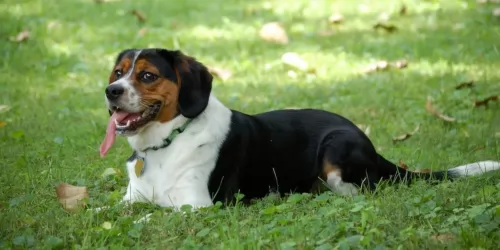 If you decide to bring a Beaglier to your family, it will be the best that you wait for your children to grow up a little bit. They are great to play buddy, but they get carried with the game and they can be very careless during the play. They fit perfectly with the children above the age of 5. They will run, jump, and do whatever your kid is about to do. They are friendly towards children they don’t know but they don’t do well with other animals they don’t know.
If you decide to bring a Beaglier to your family, it will be the best that you wait for your children to grow up a little bit. They are great to play buddy, but they get carried with the game and they can be very careless during the play. They fit perfectly with the children above the age of 5. They will run, jump, and do whatever your kid is about to do. They are friendly towards children they don’t know but they don’t do well with other animals they don’t know.
watchdog
One the main reasons why Beagliers are so much popular lay in their adaptability to any living conditions. They will fit in instantly in a family with children, but they will be happy as well if they live with just one person or even seniors. They can live indoors, houses and apartments without the yard. The Beaglier will enjoy the city parks, dog parks, beach, walking down the crowded streets. This breed is a not a quiet one – they will bark every time they notice something just to let you know. But, they are not aggressive type and they usually bark to communicate with people.
Usually, they are trained very easy. They have a stubborn nature, and if you learn how to get over with this temperament, you will be able to train and raise the sweetest dog ever. They should be trained and socialized while they are still puppies. Since they like too much, the best advice is to use treats to teach them everything that they will need to know. But, be careful with the feeding after the treats – Beagliers get easily obese if they are overfed.
 They were bred to hunt and so are active dogs needing daily exercise and long walks.
They were bred to hunt and so are active dogs needing daily exercise and long walks.
They are at risk for back problems being long-backed dogs. The most common type of back problem is Intervertebral Disc Disease. This can cause pain and paralysis and can be caused by jumping, obesity or intense exercise.
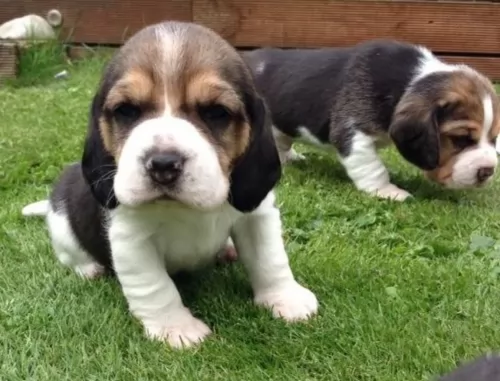 The Beaglier flap ears can be a very great place for the fungi, bacteria and dirt. You will have to clean their ears with an ear cleaning solution and a soft tissue once a week, especially if your pet is playing outside.
The Beaglier flap ears can be a very great place for the fungi, bacteria and dirt. You will have to clean their ears with an ear cleaning solution and a soft tissue once a week, especially if your pet is playing outside.
Cherry eye: Starts as redness in the corner of the eye. Happens when the third eyelid gland slips out of its place and show up as a red blob in the corner of the eye. Sometimes, the gland gets back to its original place in a couple of days, but it will be the best if you can take your dog to the vet as soon as you notice any readiness in his eyes.
Glaucoma: Happens because of the high eye pressure. This affects the normal outflow of the eye fluids and can cause blindness if not treated. It is the best to for your beagle to regular eye checks since this condition is not easy to diagnose in the begging.
 Whether a puppy or adult the breed is subject to obesity and needs to be fed a good, vitamin filled dry dog food. At the same time they need the calories if they are active or hunting.
Whether a puppy or adult the breed is subject to obesity and needs to be fed a good, vitamin filled dry dog food. At the same time they need the calories if they are active or hunting.
About one quarter to one half cup twice a day.
About one half cup twice a day until they become seniors or less active then reduce to a fourth of a cup twice a day.
The Alpine Daschbracke was bred to work. He needs exercise at least a couple times a day.
This breed is playful and loves to find and retrieve. Daily exercise is essential.
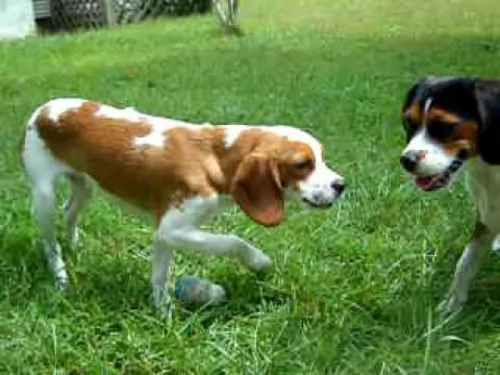 If you are not sure about the dog food you should give to your Beaglier considering the living environment and the lifestyle, it is always the best option to listen to the vet’s advice. They are prone to the obesity so you should keep a schedule that won’t be changed much. Feed them every day at the same time, no more than two meals per day once they get older than 6 months.
If you are not sure about the dog food you should give to your Beaglier considering the living environment and the lifestyle, it is always the best option to listen to the vet’s advice. They are prone to the obesity so you should keep a schedule that won’t be changed much. Feed them every day at the same time, no more than two meals per day once they get older than 6 months.
If you want your Beaglier to be happy, make sure you groom him daily. You will need about 5 minutes per day to brush him and keep him out of the tangles. Bathe then once in a month, that will be enough. Clip their nails regularly. Keep their ears cleaned.
They need a daily activity or they will get destructive. Be careful with the feeding since they get obese very quickly.
Since they are natural hunters, they will like to play chase. You can take them to the woods for a walk or for a run but make sure you train them to respond to your commands before you take them off the leash. They are very curious and they will easily wander off. They can be taught to play inside the house as well. They love to explore new areas so it will be great if you can take them with you for a holiday.